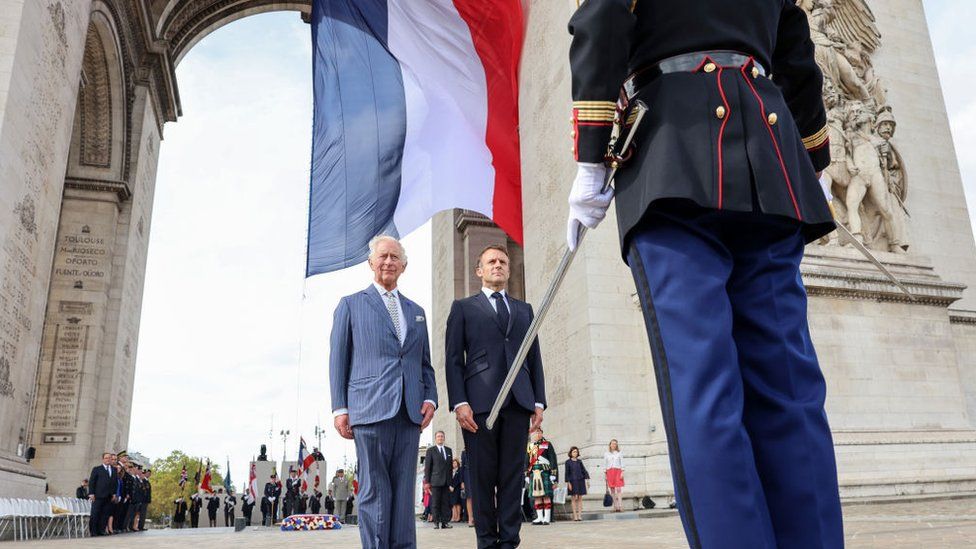
The King and President Emmanuel Macron attended a ceremony of remembrance and wreath-laying at the Arc de Triomphe
By Sean Coughlan, royal correspondent
at the Palace of Versailles
There was an abundance of ceremony and security as the King and Queen’s state visit to France got under way in Paris on Wednesday afternoon.
The Arc de Triomphe, with a flypast trailing the colours of the French flag, was the first backdrop for this diplomatic theatre, with President Emmanuel Macron pulling out all the stops for his royal visitors.
And there was Mick Jagger shouting “bon soir” as he rolled into the Palace of Versailles for a state banquet, representing rock royalty.
Queen Camilla took her place on the Versailles red carpet in a blue Dior cape, while the King and President Macron did that pretending to talk thing, while they lined up for the cameras.
Former Arsenal boss Arsene Wenger seemed surprised to be one of the final guests, looking rather lost on the red carpet like a goalkeeper stranded in the wrong penalty box.
But there’s a serious purpose below this minutely-choreographed pageantry and celebrity. A state visit is a strange mix of PR and politics.
This was about visibly reinforcing a key alliance between Britain and France and over the next few days there will be a checklist of areas of common interest – trade, the environment, culture and defence.
Image source, PA Media
The British royals were guests of honour at a dinner hosted by President Macron in the Palace of Versailles’ Hall of Mirrors
This was all toasted at a banquet – blue lobster to start – where even the cheeses had to be balanced with one British, Stilchelton, and one French, Comte.
The King’s speech for the banquet toast was delivered in French and English, which is always a diplomatic crowd pleaser. And he remembered hearing how his mother had danced in Paris in 1948 as a young newly-wed in her twenties.
The then Princess Elizabeth had been serenaded by Edith Piaf. She would have been pregnant with Charles by then and he said: “I suspect it may have left an indelible impression on me, even six months before I was born. La Vie en Rose is one of my favourite songs to this day.”
The background to all of this politesse, as the French newspapers made clear, was about nurturing a relationship that might have been strained by Brexit.
But a survey of what the French and British public feel about each other, published to coincide with the state visit, suggested that we actually quite like each other.
There were 72% of people in Britain and 76% in France who thought that although the countries might sometimes “squabble”, in the end the countries were “natural friends and close allies”, in this survey of over 2,000 people by Portland Communications.
Image source, Reuters
Rock royalty Mick Jagger was in attendance at the black tie dinner
There were big differences though in attitudes towards the monarchy. Only about a quarter of French people would prefer a constitutional monarchy like Britain and about a quarter of people in Britain would support a republic like France.
The French public thought that policing was better in the UK than their own, but only 10% preferred British cooking.
In another insight, the survey found by a big margin that people in Britain believed that King Charles would have voted to remain in the EU in the Brexit referendum.
But if the question from the current state visit had been how did the French public respond to the King and Queen – it would be impossible to say.
Because such state visits are also dominated by a huge road-blocking security operation. In Paris it wasn’t liberte, egalite, fraternite but securite, securite, securite.
There was little chance so far for the French crowds to see the King and Queen. At the Arc de Triomphe there were soldiers, police and a big media contingent, but the ordinary Parisians were kept far away behind security barriers.
Image source, Reuters
It is the King’s second state visit as monarch
It was the same in Versailles, with a secure distance between the diners at the banquet and the ordinary people that the Sun King Louis XIV would have appreciated.
This was the first of a three-day visit, with the King set to give a speech to the Senate and travel to eco-projects in Bordeaux.
So expect more photo opportunities as the heads of state of the two countries show each other a taste of the entente cordiale.








